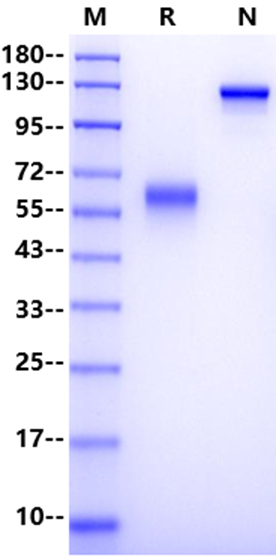Thr66-Met247, with C-terminal Human IgG Fc
TMAIWRSNSGSNTLENGYFLSRNKENHSQPTQSSLEDSVTPTKAVKTTGVLSSPCPPNWIIYEKSCYLFSMSLNSWDGSKRQCWQLGSNLLKIDSSNELGFIVKQVSSQPDNSFWIGLSRPQTEVPWLWEDGSTFSSNLFQIRTTATQENPSPNCVWIHVSVIYDQLCSVPSYSICEKKFSMIEGRMDPKSSDKTHTCPPCPAPELLGGPSVFLFPPKPKDTLMISRTPEVTCVVVDVSHEDPEVKFNWYVDGVEVHNAKTKPREEQYNSTYRVVSVLTVLHQDWLNGKEYKCKVSNKALPAPIEKTISKAKGQPREPQVYTLPPSRDELTKNQVSLTCLVKGFYPSDIAVEWESNGQPENNYKTTPPVLDSDGSFFLYSKLTVDKSRWQQGNVFSCSVMHEALHNHYTQKSLSLSPGK
>95% by SDS-PAGE
1.Yaqiong Wang,Xianzhe Li, Xialian Xu,Jinbo Yu, Xiaohong Chen, Xuesen Cao,Jianzhou Zou,BoShen and Xiaoqiang Ding. Clec7a expressionin inflammatory macrophages orchestrates progression of acute kidney injury. Frontiers in Immunology.
C-type lectin domain family 7 member A (Clec7a, or Dectin-1) is a transmembrane protein containing an intracellular immunoreceptor tyrosine-based activation (ITAM)-like motif and an extracellular C-type lectin-like domain for recognition. Clec7a is expressed by macrophages and some other immune cells and is believed to control the innate immune responses to pathogens and the phagocytotic properties, through regulating phagocytosis and production of reactive oxygen species (ROS). Moreover, a recent study has shown that Clec7a is critical for macrophage polarization during renal interstitial fibrosis.
